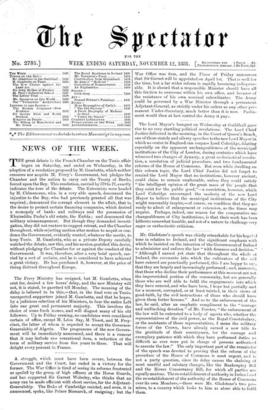The Lord Mayor's banquet on Wednesday at Guildhall gave rise
to no very startling political revelations. The Lord Chief Justice delivered in the morning, in the Court of Queen's Bench, one of those stately and silvery speeches to the new Lord Mayor in which no orator in England can surpass Lord Coleridge, dilating especially on the apparent unchangeableness of the municipal institutions of the City of London, during centuries which have witnessed two changes of dynasty, a great ecclesiastical revolu- tion, a revolution of judicial procedure, and two fundamental reforms of the House of Commons. But even while dwelling on this solemn topic, the Lord Chief Justice did not forget to remind the Lord Mayor that no institutions, however ancient, could claim to remain unalterable, unless they could satisfy "the intelligent opinion of the great mass of the people that they exist for the public good,"—a conviction, however, which Lord Coleridge encouraged the modesty of the new Lord Mayor to believe that the municipal institutions of the City might reasonably inspire,—of course, on condition that they are ready to admit of enlargement or extension, as the times may require. Perhaps, indeed, one reason for the comparative nn- changeableness of City institutions, is that their work has been hitherto somewhat humble, and not of a nature to challenge very eager or enthusiastic criticism.


































